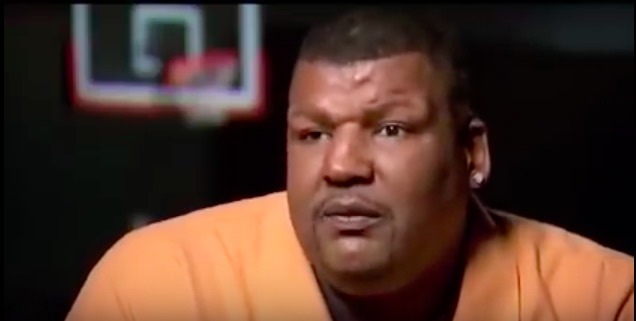
YouTube
Imagine that tomorrow you sign a contract to be a desk monkey for some Auditing firm. You’re making good money and there is no shortage of nerdburgers trying to snatch your job. One day, a flip switches and you end up smashing a McDonald’s cash register at a rest stop. Your employer hears of your antics and would rather employ someone who isn’t a physical threat to the office. Your contract is void. This is bad.
Then you get a call from your employer, saying that he feels bad about canning you, so he will pay you $153,000 a year for the next 25 years just to bury the hatchet.Happy birthday.
Well, that’s basically what happened to Utah Jazz’s 1993 first round draft pick Luther Wright. Unfortunately, Wright’s career never took off, as mood swings fueled by a tortured childhood and bipolar disorder derailed his pro career. The Jazz’s investment in the 7’2” Seton Hall alum never paid off, but the organization decided to do something incredible.
Here is the story, courtesy of Total Pro Sports, as first appeared on Fadeaway World:
“Luther Wright was a 7’2 center out of Seton Hall who was drafted with the 18th pick in the 1993 NBA draft, a draft which included the likes of Chris Webber, Penny Hardaway, and Sam Cassell.
Wright was selected by the Utah Jazz to play behind starting center Felton Spencer, and perhaps alongside backup power forward Tom Chambers to form a nice backup frontcourt for when Karl Malone sat out.
Despite his draft position and above-average sophomore season at Seton Hall, Wright’s stint in the NBA would be anything but successful.
After playing in only 15 games for the Jazz and only averaging 1.3 points and 0.7 rebounds across those games, Wright would be found by Salt Lake City police destroying property and causing a disturbance at a rest area just outside Salt Lake City in late January.
Luther would be diagnosed with bipolar disorder — A disorder associated with episodes of mood swings ranging from depressive lows to manic highs — during his NBA career, and after the 1993-94 NBA season had finished for the Jazz, Wright would be admitted into a mental institution for a 30-day stay.
Because Wright never completed his rookie season, let alone the length of his contract due to pretty rare circumstances, the Utah Jazz front office decided to do the right thing and beginning in 1996, elected to pay Wright the remainder of his owed earnings from his NBA career over a 25-year period, equalling out to $153,000 a year up until 2021.”
The Jazz converted his five-year, $5 million contract into an annuity that would pay Wright $153,000 for the next 25 years. As of today, the Jazz still owe Wright $459,000.
Wright’s life spiraled downward, fueled by drug addiction and depression, that ultimately ended up with him living on the streets for the better part of a decade. After a doctor was forced to cut two of his toes off, he decided to turn his life around. Now, at age 46, has ditched the drugs and secured a job at his alma mater, Seton Hall. A new man, Wright said:
“I know in my heart I’m a good person who made several bad mistakes, and maybe I should have died. That person I was died, but this new person wants to live.”
Well that makes me feel good.
[h/t Total Pro Sports]